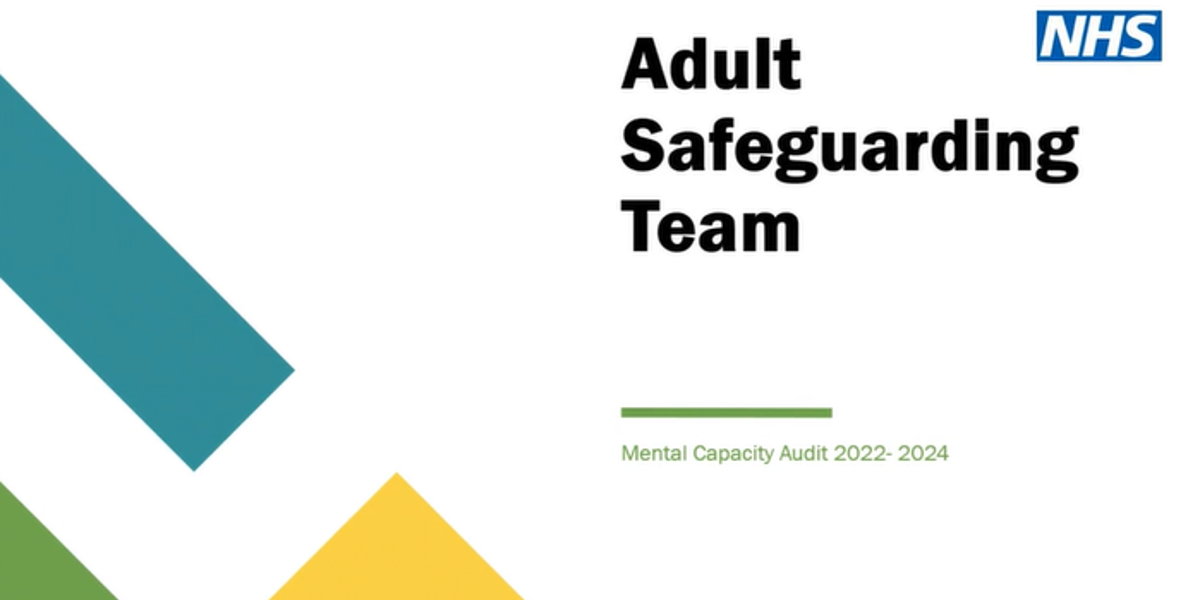QI showcase: Mental Capacity Audit
- QI Showcase
- QI Improving Processes

What is a QI Showcase?
QI Showcase aims to foster a culture of collaboration, learning and collaboration by producing a series of videos celebrating the Trust's best practices. By showcasing the work undertaken by our teams, we can celebrate their achievements and inspire others to push their boundaries within quality improvement.
Project Name: Mental Capacity Audit
Date: July 2024
Delve into this engaging presentation to discover the evolution of a mental capacity audit, highlighting how it has been refined over time to streamline processes and achieve improved results.
Hello everyone, I'm Nettie, and I’m the Adult Safeguarding Lead for CCS. Today, I’ll be discussing a mental capacity audit that we completed in 2022, and we’re currently repeating it now.
In 2022, we completed a relatively small audit with a sample size of 16, drawn from a designated cohort. There was a lot of learning from this audit. A high proportion of the mental capacity assessments we audited were requested by the Adult Safeguarding Team, with five of them being picked up by the team itself. We also found a lack of confidence among staff. Despite completing their mandatory training, which is available on ESR, many staff still didn’t feel confident about how to complete a formal mental capacity assessment. This led to some unrest among the staff.
As a result, our audit recommendations included starting some MCA workshops. These workshops would be face-to-face, where we would walk through a mental capacity assessment with staff using a scenario relevant to their practice. We would also discuss various issues identified in the audit, such as how to identify if someone has an impairment of the brain, scenarios where a mental capacity assessment needs to be considered, what to do if the patient is not engaging, and how to document it correctly. We also considered implementing mental capacity assessment competencies, which we have since done. Additionally, we decided to increase the visibility and accessibility of the Adult Safeguarding Team.
Here’s a timeline of what we’ve done over the past two years. We piloted some MCA workshops in Norfolk, collaborating with Children’s Services and Norfolk iCASH. We’ve worked on increasing the visibility of the team. While we work trust-wide and are from different localities, we try to visit different services regularly, at least once a month. This includes covering all iCASH services and we’re planning to visit Dynamic Health next, as well as various Children’s Services.
I’ve also visited Cringleford, where we reviewed mental capacity assessments on System One. This was quite a big task. The assessments were long and not very readable for clinical staff. Moreover, there were multiple versions of them. We combined these versions to make them more streamlined and easier to read. We then launched this to all services, including Children’s Services. We presented it to all the different ICBs for the localities we cover.
Additionally, we started an MCA drop-in clinic, where anyone could drop into our Teams chat to ask questions about MCA. We ran this clinic for three to four months, and we are now in the process of writing up the report.
When I first did the audit in 2022, I thought I had it all figured out. However, there were several areas I hadn’t really handled from scratch. I had the forms, collected the data, and passed it on to someone else. This time, we focused much more on planning, setting clear targets, and ensuring we had those in place from the beginning, as I didn’t have that before. In 2022, things became a bit muddled and prolonged. I also didn’t use any data collection tools at that time, but now I realize how invaluable they are. They’re incredibly easy to use, and they automatically calculate the percentages, which saved me a lot of time compared to manually doing it. This time, we expanded the audit to include 40 people and made it trust-wide, involving every single service. We also received great engagement from the SystmOne teams in order to gather that information.
We’ve also distributed a staff questionnaire. In 2022, we identified a confidence issue, but it was based on anecdotal evidence. This time, we sent out a staff questionnaire, which closed on June 30th, to gather more concrete data on this.
Looking ahead to 2024, staff are still showing low confidence unless they have attended an MCA workshop. However, there has been a significant increase in mental capacity assessments being completed based on professional judgment. There’s been a 41.5% increase in assessments completed this way, compared to just 12.5% two years ago. There are still some challenges with identifying impairments of the brain, so we are considering bringing back our mental capacity workshops to address this. Additionally, only one Children's Service has completed an MCA, so this remains a significant area of focus.
Thank you.
If you'd like to watch more inspirational videos about projects, head to our QI Case Studies page for inspiration.
Last reviewed:
1 March, 2025
